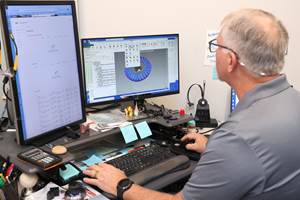CAD/CAM Helps Shop Achieve Tight Tolerances for Medical Components
For Valley Machine, manually programming its turn-mills was time-consuming, requiring multiple edits. Esprit software's CAD/CAM postprocessors eliminated code editing and sped production of complex medical parts.
Share






Valley Machine specializes in suppling precision-machined components as well assemblies for customers in the medical, semiconductor, photonics, optics and aerospace industries. To best support this variety of industries, the North Plains, Oregon, machine shop uses a range of equipment, including vertical machining centers; horizontal machining centers; conventional turning centers; two Miyano BNJ42S twin-turret, twin-spindle turn-mills; and an Index C200 three-turret, twin-spindle lathe.
Previously, the manually written numerical control (NC) code for turning centers often required significant editing before it would enable those machines to produce good parts, eating away at the programmer’s available time while leaving the machine idle.
To remedy this, Valley Machine decided to implement CAD/CAM software for its standard turning centers and more complex turn-mill machines. After evaluating numerous packages, the shop chose Esprit CAD/CAM software from DP Technology Corp. (Camarillo, California), in part because of its standard postprocessors, which could generate code that required no editing for the shop’s machines, therefore eliminating the time and cost involved in proving out the code.
The primary feature for generating edit-free code is the software’s multi-channel synching ability, which is said to effectively enable coordinated motion of multiple turrets and spindles on the turn-mills. Another important capability is simulation, which enables programmers to view the complete machining operation offline—including simulated parts, tools and machining—prior to post processing.
After purchasing the new software and attending a week-long training program, Valley Machine immediately began modifying jobs that it had previously run, and it began programming new orders on its two Miyano BNJ42S machines. For these machines, Esprit helped reduce the cycle times required to produce complex parts by moving operations from one spindle to another so that both spindles were continuously working.
Once the shop was confident Esprit could handle its complex programming needs, it began to optimize the machining capabilities of its new Index C200 to effectively machine an important component for one of its medical customers. This project involved producing 2,000 medical interconnects made from 303 stainless steel. Previously, the shop faced many challenges in trying to manufacture these medical interconnects. For instance, in addition to problematic handwritten programs, the machine on which these parts were originally manufactured could not hold the required tolerances. Instead, the company had to machine the parts on a twin-spindle lathe and then move them to a VMC to machine the face holes and other profiles, which cost valuable production time and money. The company reduced the time required to produce these parts by 30 percent by moving them to the Index C200 machine and using Esprit to quickly resequence cutting operations.
Now, the company can hold tolerances within a few ten-thousandths of an inch by resequencing operations to avoid the potential for deflection that could cause machining errors. In addition, the shop can use the software to produce solid, edit-free lathe programs that help reduce both setup and cycle times, while also improving part quality.
Today, Valley Machine enjoys quicker machine setup times in Esprit with postprocessors that consistently generate accurate NC code, saving valuable machining time and increasing productivity. The shop says it can now efficiently machine any part on its complex turn-mills with the software. Jeremiah Archer, lead programmer at Valley Machine, notes that it is also easy to make changes and try new machining strategies when a part is programmed in Esprit, because the software’s realistic, full-machine simulation enables visualization of each operation. Valley Machine continues to expand its technology and capabilities, and it is gaining additional opportunities to machine more complex parts in new markets with the help of Esprit.
“The support we received prior to even purchasing the product was superior, and immediately providing the help I need is something at which the Esprit support team excels,” Mr. Archer says. “There was never a hesitation when I asked to borrow a machine setup or post for evaluation.”
Related Content
TTI Brings Specialty Gear Production In-House with Multiaxis Machining
By investing in a 3+2-axis machine and utilizing simulation software for diagnostic checks, Techtronic Industries turned a four- to ten-week lead time into a one- to two-week lead time.
Read MoreBlueprints to Chips: CAD/CAM Tips and Tricks
This collection of articles delves into the latest CAD/CAM innovations, from AI-driven automation and optimized tool paths to the impact of digital twins and system requirements.
Read MoreBringing Machining In-House to Keep up With Demand for Offroading Parts
To meet demand increases for its Ford offroad industry components, supplier RPG Offroad brought its machining processes in-house, saving the company nearly $50,000 per month. Here’s how its choice of integrated CAD/CAM software made it happen.
Read MoreThe Power of Practical Demonstrations and Projects
Practical work has served Bridgerland Technical College both in preparing its current students for manufacturing jobs and in appealing to new generations of potential machinists.
Read MoreRead Next
AMRs Are Moving Into Manufacturing: 4 Considerations for Implementation
AMRs can provide a flexible, easy-to-use automation platform so long as manufacturers choose a suitable task and prepare their facilities.
Read MoreLast Chance! 2025 Top Shops Benchmarking Survey Still Open Through April 30
Don’t miss out! 91ÊÓƵÍøÕ¾ÎÛ's Top Shops Benchmarking Survey is still open — but not for long. This is your last chance to a receive free, customized benchmarking report that includes actionable feedback across several shopfloor and business metrics.
Read MoreMachine Shop MBA
Making Chips and 91ÊÓƵÍøÕ¾ÎÛ are teaming up for a new podcast series called Machine Shop MBA—designed to help manufacturers measure their success against the industry’s best. Through the lens of the Top Shops benchmarking program, the series explores the KPIs that set high-performing shops apart, from machine utilization and first-pass yield to employee engagement and revenue per employee.
Read More






















